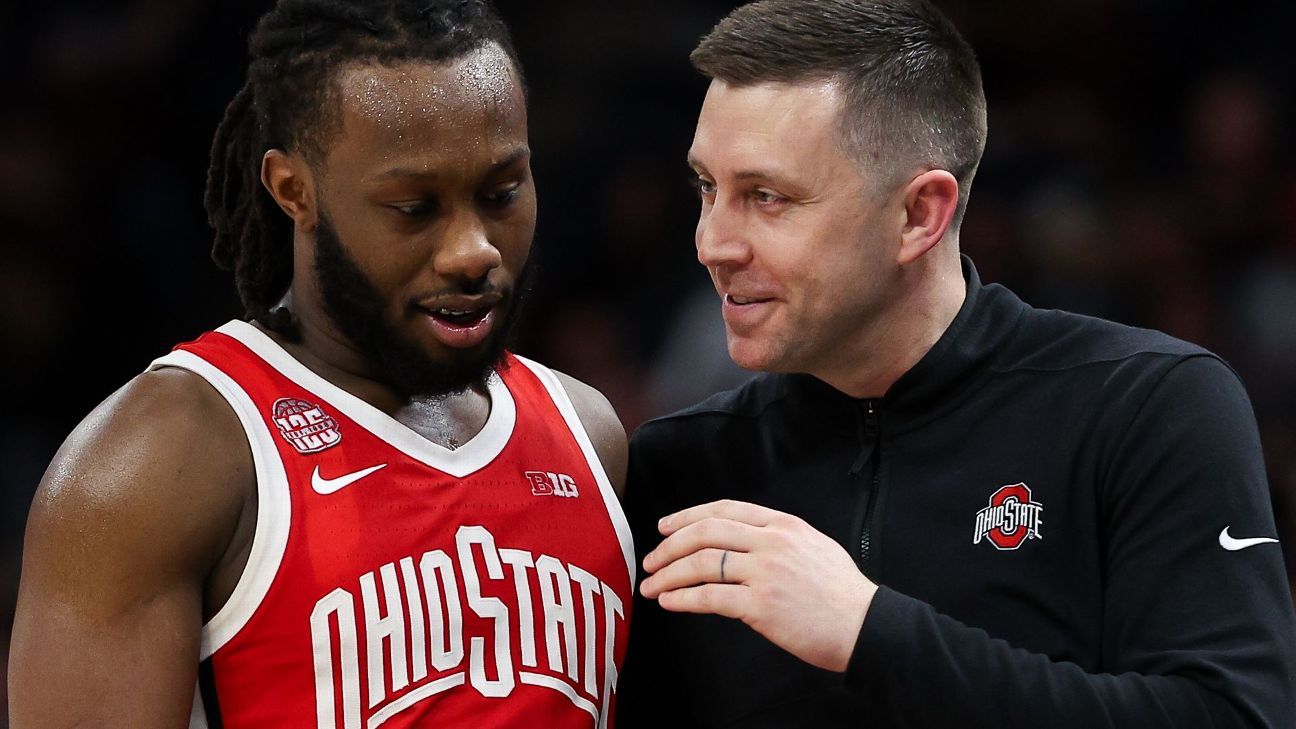Ohio
Sources: Ohio State expected to promote Diebler

Ohio State is expected to promote interim head coach Jake Diebler to the full-time role, sources told ESPN on Saturday night.
Diebler took over for Chris Holtmann in mid-February after the seventh-year head coach was fired following a 4-10 start to Big Ten play. In his first game as interim head coach, Diebler led Ohio State to a 73-69 win over then-No. 2 Purdue.
The Buckeyes went 6-2 after Diebler took over, advancing to the quarterfinals of the Big Ten tournament before narrowly losing on Friday night to Illinois, 77-74. They played themselves onto the NCAA tournament bubble with regular-season wins over the Boilermakers, Michigan State and Nebraska and then a conference tournament victory over Iowa.
Diebler joined Holtmann’s staff in 2019 after spending three years under Bryce Drew at Vanderbilt. The older brother of former Ohio State guard Jon Diebler, who left the Buckeyes as the Big Ten’s all-time leader in 3-pointers made (he has since been passed by Iowa’s Jordan Bohannon), his first stint in Columbus came as the video coordinator on Thad Matta’s staff from 2014 to 2016.
Diebler also spent time as an assistant coach under Drew at Valparaiso, where he played his college ball. He averaged 5.1 points in 116 games as a player at Valpo.
Barring a surprise on Selection Sunday, Ohio State will miss the NCAA tournament for the second straight season. The Buckeyes haven’t been out of the first weekend of the tournament since 2013, when Matta led them to the Elite Eight. Diebler’s first task will be aiming for some level of roster continuity, with the NCAA transfer portal opening on Monday.

Ohio
A missing 12-year-old Georgia girl is found in Ohio after her community galvanized to locate her

ATLANTA — A 12-year-old girl whose disappearance galvanized a Georgia community has been found in Ohio.
Hall County Sheriff Gerald Couch said Friday that Maria Gomez-Perez was found Thursday in Dover, about 70 miles (110 kilometers) south of Cleveland, in the company of a Guatemalan man who is now jailed.
“I come to you with some very great news,” Couch told reporters in a news conference. “Maria Gomez-Perez has been safe in Dover, Ohio, and she should be on her way home here to Gainesville with our investigators within the hour.”
Gomez-Perez was last seen at the home of her father, Andres Gomez, on May 29 in Gainesville, about 50 miles (80 kilometers) northeast of Atlanta. She was reported missing a day later.
Her disappearance sparked a huge search, with local authorities and businesses offering a $20,000 reward. Volunteers canvassed the community looking for the girl and papered the area with posters, flyers and even billboards seeking the girl’s return.
Couch said investigators found Gomez-Perez had been communicating online with men, expressing unhappiness and saying she wanted to leave home. He said investigators believe Antonio Augustin drove to Georgia, picked up Gomez-Perez, and drove her back to Augustin’s home in Dover. While Couch said Augustin is 31 years old, Ohio jail records list him as 34.
“Let me be very clear on this: Maria is the victim in this case,” Couch said. “And remember, she’s 12 years old.”
Couch said investigators began to home in on Gomez-Perez’s location when she contacted her father using a new Facebook account last week, telling her father that she was OK and not coming home, and asking her father to stop looking for her. Couch said investigators used that message to track down the Facebook page’s internet address, leading them to a phone number associated with a home in Dover.
Four sheriff’s investigators traveled to Ohio this week and spotted Gomez-Perez at a city swimming pool, later arresting Augustin and recovering Gomez-Perez. Couch said Gomez-Perez was examined by medical personnel.
Tuscarawas County jail records show Augustin is being held on a rape charge. Jail records don’t list an attorney who can speak for him and officials with the Tuscarawas County Sheriff’s Office didn’t immediately return a phone call and an email seeking comment.
Couch said Georgia authorities will also be seeking criminal charges against Augustin.
Officials in Georgia had faced initial criticism in the search for Gomez-Perez, in part because the Georgia Bureau of Investigation concluded that her disappearance didn’t meet the criteria for issuing an Amber Alert for missing children. Many residents in the Gainesville area are Hispanic, coming to the city to work in its poultry processing industry, but most officials are not of Hispanic descent, which can create divides.
“It’s hard to put into words what we saw. I just really, really am proud of our community,” Gainesville Mayor Sam Couvillon told The Times of Gainesville on Friday. “Our Hispanic community just really stood up and made their presence known and said, ‘Hey look, let’s shine a light on this missing child.’”
Couch concluded his remarks with a warning to parents to watch their children’s online activity.
“Technology is a wonderful thing. It helped us locate Maria. But technology can also be used for evil. It’s why Maria was able to leave Gainesville with a stranger and travel nine hours away from home,” Couch said. “So please know what your children are doing and who they’re communicating with. They’re our most vulnerable and our most valuable citizens and it is our duty to take care of them.”
Ohio
How JD Vance's Ohio hometown defied his expectations

By Nicholas P. Brown
MIDDLETOWN, Ohio (Reuters) – In his bestselling 2016 memoir, Republican vice presidential hopeful JD Vance questioned whether rural, white Americans, like those in his native Middletown, Ohio, had the drive to reverse their economic decline. But as Vance was writing, his hometown was in the thick of the grassroots revitalization he envisioned.
Vance’s “Hillbilly Elegy: A Memoir of a Family and Culture in Crisis” tried to explain the mindset of white Appalachian voters at a time when many Americans were baffled by the popularity of Donald Trump, who would win the presidential election later that year.
The Yale-educated Ohio senator, who was tapped earlier this month to be Trump’s running mate in the Nov. 5 election, urged this struggling cohort to take more responsibility for its problems, stop looking to government or big companies for solutions, and work harder to improve its lot.
Chunks of Middletown still encapsulate the hackneyed images of the disenfranchised industrial hubs Vance wrote about: shabby strip malls sit along sprawling, potholed thoroughfares in a city where Trump flags fly from pickup trucks.
But there’s a different vibe in the southwestern Ohio city’s downtown. A brewery, wine bar, art collective, and even an opera house surround intersections bridged by sleek brick crosswalks and walls brightened by murals. Rainbow flags, left over from last month’s LGBTQ Pride celebrations, hang in several windows.
It’s part of a revitalization that, while far from complete, conflicts with the 2016 book’s portrayal of a community that is a “hub of misery,” and whose people react “to bad circumstances in the worst way possible,” according to some 20 locals interviewed by Reuters.
“We’ve been through this before, where we’ve had to reinvent ourselves. That’s what I think people lose sight of,” said Sam Ashworth, trustee and former executive director of the city’s historical society.
Ashworth noted that the city’s population, which is about 78% white, experienced industrial shifts throughout the 20th century that saw the loss of jobs in the tobacco and paper industries. “JD’s time in Middletown was very short,” said Ashworth, 83.
The Middletown of Vance’s youth was reeling from contraction and labor disputes at its AK Steel plant, which in 2003 – the year Vance graduated from high school – employed around 4,000 people, sharply down from its heyday in the 1970s.
The 2007-2009 recession compounded the strain, triggering a decline in city property tax revenue. AK Steel continued to downsize, employing about 2,300 people in 2012, municipal financial records show. The plant is owned today by Cleveland-Cliffs Inc.
Vance’s memoir referred to disenfranchised white communities as “a pessimistic bunch,” asking rhetorically if they were “tough enough” to hold themselves accountable for their plight and reverse their fortunes. “We created the (problems), and only we can fix them,” the future U.S. senator wrote.
Middletown, part of a staunchly conservative congressional district that voted overwhelmingly for Trump in the 2016 and 2020 presidential elections, is trying to do just that.
Between 2012 and 2022, the city’s income tax revenue spiked from $19.7 million to $33.6 million, according to official records. Optimism has been further fueled by Cleveland-Cliffs’ announcement this year of a $2 billion investment in its Middletown Works steel plant, and the city has approved a new, $200 million commercial development on 50 acres of municipal land.
The city, with a population of about 51,000, still grapples with high poverty and low median income, and the 75-bed Hope House Mission, a local homeless shelter, remains consistently full, said Tim Williams, the shelter’s vice president of homeless services.
But the situation is improving, and locals credit that to the kind of bootstraps-style initiative whose prospects Vance had questioned. “He makes it sound like this place sucks you in and that you’re destined to fail,” said Rochelle Zecher, a 42-year-old shop owner. “But this community builds itself up.”
Vance’s press secretary had no immediate comment on Reuters’ reporting.
FEDERAL FUNDS
In 2011, the city government and the Middletown Community Foundation created Downtown Middletown Inc, a nonprofit organization that helps market the city’s commercial district. With capital limited after the recession, city leaders got creative in finding money, including by using funds left over from a previous redevelopment loan.
That same year the city persuaded Cincinnati entrepreneur Jim Verdin to refurbish a building that now houses the Pendleton Art Center, creating space for 30 art vendors at little cost to Middletown.
Triple Moon Coffee Company, across the street from the art center, was launched in 2015 by lifelong Middletown resident Heather Gibson, who opened it with funds from her partner’s long-forgotten AK Steel retirement account.
The cafe is one of at least five LGBTQ-owned businesses in Middletown, said Duane Gordon, spokesman for the Middletown Pride Committee, who added that the city’s outreach to a wider array of communities helped spur its economic revitalization.
Middletown navigated the coronavirus pandemic with help from the federal government, receiving $19 million from Democratic President Joe Biden’s American Rescue Plan of 2021. City businesses got a combined $75 million from the Paycheck Protection Program – a business loan initiative signed by Trump and later extended by Biden – according to the federal government’s pandemic spending database.
The Republican Party’s 2024 platform promises to “rein in wasteful federal spending” as a way of “promoting economic growth,” and Vance has voiced skepticism about how much federal policymakers can do for local communities.
But Gibson, who used her PPP loan to open a drive-through behind her cafe, said federal money saved her business.
“It was a sink-or-swim moment,” she said.
(Reporting by Nicholas P. Brown; Editing by Paul Simao)
Ohio
Big Lots closing stores nationwide. Are Ohio locations still open? What we know

See which 13 Big Lots stores are closing in Arizona
Big Lots is closing dozens of stores nationwide, including some in Arizona.
Fox – 10 Phoenix
Big Lots announced plans to close 35-40 stores this year, following a June 13 bankruptcy filing with the U.S. Securities and Exchange Commission.
The discount chain, headquartered in Columbus, cited “elevated inflation” and a significant decrease in consumer spending as reasons behind the closures. According to the filing from Big Lots, “In 2024, the U.S. economy has continued to face macroeconomic challenges, including elevated inflation, which has adversely impacted the buying power of our customers,” the company stated.
Big Lots has 102 Ohio locations and currently operates more than 1,350 stores in the U.S., down from 1,425 in early 2023.
Plans to shut down dozens of stores remain underway, but the company intended to open three more locations, according to the bankruptcy filing.
Here’s what we know about the fate of Big Lots’ Ohio locations.
Are Ohio Big Lots locations closing?
Ohio Big Lots stores appear to be safe for now, based on the company website. While the company has not released a full list of store closures, none of Ohio’s 102 locations were listed as closing, which is marked by banners on the webpages as “Closing this location.”
Where are Big Lots stores in Ohio?
Ohio is No. 4 in the nation for the number of Big Lots stores with 102, behind Texas (116), California (109) and Florida (106). The discount chain has two locations in Akron, one in Canton, five in Cincinnati and five in Columbus, according to its website.
Additionally, Big Lots operates several stores in Toledo and Cleveland and has many locations near Ohio’s biggest cities, including Dublin, Grove City, Blue Ash, Milford, Middletown, Miamisburg, Mentor and Beachwood.
Big Lots also has 40 locations in Kentucky, including in Covington and Newport near Cincinnati.
Surge in bankruptcies
June saw the highest level of bankruptcies since the COVID-19 pandemic in early 2020, according to a report by the Wall Street firm S&P Global.
This year’s bankruptcies have totaled 346, “higher than any comparable figure in the prior 13 years,” S&P said. “High interest rates, supply chain issues and slowing consumer spending continue to weigh on struggling companies,” the note states.
From March 2022 to July 2023, the Fed hiked its key interest rate from near zero to a range of 5.25% to 5%, a 23-year high, in an effort to tame a pandemic-induced inflation spike.
Recent reports underscore that inflation eased notably in May, with a key measure the Fed follows closely at 2.6%. That’s above the Fed’s 2% goal but the lowest since March 2021 and down from a peak of 5.6% in mid-2022.
But Jerome Powell, who chairs the Federal Reserve, has maintained a cautious stance about lowering rates since inflation unexpectedly picked up in the first quarter following a significant slowdown last year.
-

 World1 week ago
World1 week agoOne dead after car crashes into restaurant in Paris
-

 Midwest1 week ago
Midwest1 week agoMichigan rep posts video response to Stephen Colbert's joke about his RNC speech: 'Touché'
-

 News1 week ago
News1 week agoVideo: Young Republicans on Why Their Party Isn’t Reaching Gen Z (And What They Can Do About It)
-

 News1 week ago
News1 week agoIn Milwaukee, Black Voters Struggle to Find a Home With Either Party
-

 Politics1 week ago
Politics1 week agoFox News Politics: The Call is Coming from Inside the House
-

 News1 week ago
News1 week agoVideo: J.D. Vance Accepts Vice-Presidential Nomination
-

 Movie Reviews1 week ago
Movie Reviews1 week agoMovie Review: A new generation drives into the storm in rousing ‘Twisters’
-

 World1 week ago
World1 week agoTrump to take RNC stage for first speech since assassination attempt
















